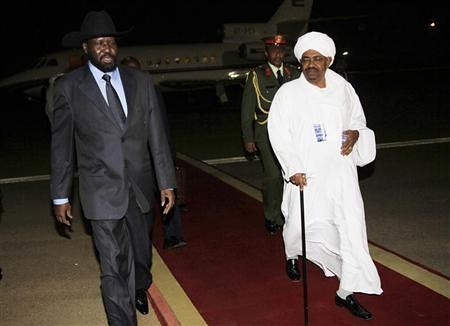
Silva Kir, the leader of south Sudan and President Omar al-Bashir of Sudan. The President said he would recognize the south if it voted for separation from the central government. Factional fighting in the south may jeopardize their independence., a photo by Pan-African News Wire File Photos on Flickr.
The Christian Science Monitor - CSMonitor.com
Sudan, South Sudan trade blame for deteriorating security
Sudan President Bashir and South Sudan President Kiir are heaping blame on one another amid first cross-border attacks.
By Nenad Marinkovic, Guest blogger
posted November 14, 2011 at 2:55 pm EST
Less than two hours after South Sudan's President Salva Kiir Mayardit concluded an address to the media and diplomatic core in Juba today, news broke out of yet another bombing by Sudan Armed Forces, or SAF, on South Sudan territory. SAF aircrafts reportedly bombed Yida refugee camp in South Sudan’s Unity state, which Enough reported on earlier today.
Sudanese President Omar al-Bashir’s recent accusations about South Sudan’s support for SPLM-N, as well as the SAF bombardment in Upper Nile state on Tuesday, prompted Kiir’s press conference.
At the briefing, Salva Kiir warned over escalation of conflict in the bordering areas. He denied all allegations of South Sudan’s support for the rebels in the North and reiterated the position of his government for peaceful resolution of the current hostilities.
The countries have exchanged harsh words and accusations in recent weeks. South Sudan has openly accused the Khartoum regime for aiding rebel groups in South Sudan for the purpose of destabilizing the country and ambition of capturing oil fields in the border areas.
On the other hand, Omar al-Bashir has accused South Sudan of supporting SPLM-N in the ongoing wars against the government in South Kordofan and Blue Nile.
The bombing of a refugee camp in South Sudan today marks a new low in relations between Sudan and South Sudan. Hostility has been brewing since even before South Sudan’s independence in July 2011, first with the SAF offensive in the disputed area of Abyei, followed by ongoing conflicts in the Nuba Mountains and Blue Nile that have triggered a wave of accusations by the Khartoum officials over South Sudan’s involvement in supporting SPLM-N. But until the SAF incursions this week, neither army had launched cross-border attacks.
Kiir remarked that Bashir’s accusations are only a “prelude to future actions against South Sudan,” explaining his view that Bashir is trying to frame South Sudan to justify military operation in the South’s oil-rich areas.
Kiir also noted that the Khartoum regime is accusing South Sudan to distract the public from real problems in Sudan, specifically the deteriorating “economic situation, Abyei, and oil,” in addition to the two ongoing wars in South Kordofan and Blue Nile. Salva Kiir noted that even before this week’s SAF bombardments, “proxy war is being waged by Khartoum and they have their mercenaries who are fighting us by proxy.”
The Yida camp attack, shortly after the conclusion of the press conference, ratchets up the threat of renewed war – and is thus deserving of a far more robust response than the international community has mustered of late.
Reacting to the deteriorating Sudan-South Sudan relations and the bombing today of the refugee camp, Enough Project Co-Founder John Prendergast warned:
The potential is high for the existing proxy conflict between Sudan and South Sudan to spill over into a full-blown war. The regime in Khartoum is growing more desperate over lost oil revenue, skyrocketing commodity prices, increasing armed and unarmed opposition, and regional pressures related to the Arab Spring.
It is prepared to return to war with the South to deflect attention from these serious internal problems. South Sudan should not take the bait, but it needs to see that the international community is willing to respond with more than just statements of concern.
No comments:
Post a Comment